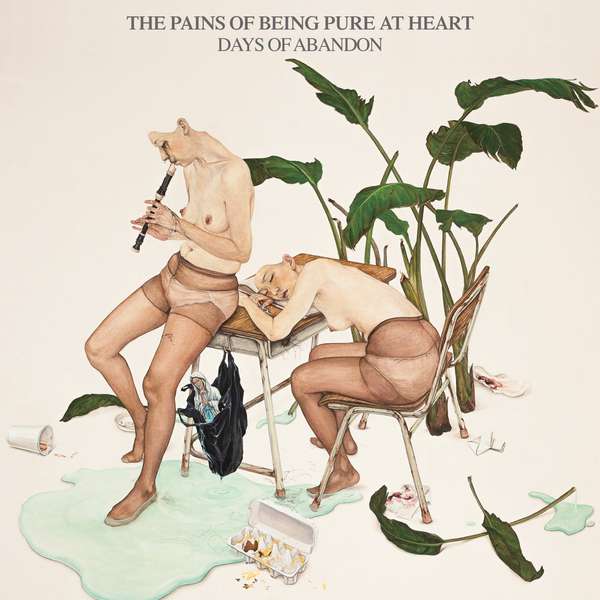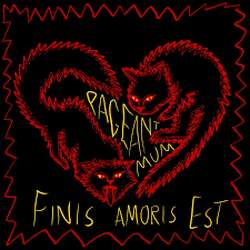Five years removed from a self-titled debut released on the legendary Slumberland Records label that to many, signaled the return of sugary indie pop and shoegaze, New York City-based group The Pains of Being Pure at Heart return with 2014’s Days of Abandon, an album that demonstrates that lead singer and guitarist Kip Berman has all but perfected his songwriting formula. Despite the shoegaze categorization and the fact that their the 2011 sophomore album Belong was slightly louder and more guitar-driven than its predecessor, TPOBPAH’s music often ignores the more grating aspects of the My Bloody Valentine sound in favor of a pleasant, cheerful atmosphere. Days of Abandon certainly follows in that pattern – it’s great as upbeat mood music to pass the time with. For me however, the fact this music lacks the rough edge of The Jesus and Mary Chain or the classic Slumberland artists like Henry’s Dress or Black Tambourine makes it a bit bland. Content to make much the same type of song from one track to the next, Berman and crew (namely bassist Alexander Naidus and drummer/keyboardist Kurt Feldman) don’t seem to be pushing or stretching themselves here, resulting in a consistent, comfortable, but unremarkable album that plays kind of like The War on Drugs’ Lost in the Dream lite.
After quiet, melancholic album opener “Art Smock” (that may have the album’s most quirky lyrics: “When I spent the night it just felt wrong, like a Felt song”), Days of Abandon establishes a more upbeat tone with the peppy “Simple and Sure.” With Berman’s breathy vocals, familiar chord structuring, and subtle synthesizer elements, the track sounds consistent with polished and catchy 1980s radio pop, a trend that continues on “Kelly,” the first of two tracks here featuring A Sunny Day in Glasgow vocalist Jen Goma singing lead. The booming bass line, off-tempo guitar accents, and uplifting keyboard runs almost give this track a cheesy feel, and it’s Goma’s light and airy but sincere vocals that keep it from becoming pure schmaltz. After the breezy opening few tracks, the tempo slows down considerably during the mid-album pairing of serene love song “Beautiful You” and the sensual, dreamy “Coral and Gold,” pieces that seem more substantial and heartfelt in context.
A driving rhythm section kicks off “Eurydice,” a track which perhaps best demonstrates the band’s knack for combining uptempo music with somber lyrics discussing themes of yearning and lost love. This is probably also the song here that’s best suited for use as a single. Berman’s vocals sound more exposed during this song’s verse, and the soaring chorus part is about as memorable a moment that exists on the album. Almost Latin-flavored guitar work during the briskly-paced “Masokissed” gives that track a bouncy, playful feel while “Until the Sun Explodes” is as close as Days of Abandon gets to replicating the vintage My Bloody Valentine style of swirling, noisy guitar. “Life After Life” has Goma returning to offer up doubled, harmonic vocals in a relaxing, midtempo track that makes nice use of a horn section and “The Asp at My Chest” provides a semi-poignant finish to the album. Imbued with a sense of longing and having a gorgeously composed, rich and full sound, this closing number gives an indication of what Berman is capable of. I just wish more of the album had been as grandiose and captivating.
Providing exactly what one would expect and nothing more, Days of Abandon is perfectly agreeable and will please fans of the group. Unfortunately, it also comes across as being uninspired, the product of a band simply going through the motions and pumping out much the same music they always have. To be honest, The Pains of Being Pure at Heart have never tried to reinvent the wheel since they are and always have been highly derivative of older groups. Still, irregardless of how good Kip Berman is at what he does, to keep slugging away producing only a single type of sound is quickly growing tiresome and somewhat pointless. One has to wonder how much effect the departures of guitarist Christoph Hochheim and keyboardist/vocalist Peggy Wang in the period between Belong and Days of Abandon had on TPOBPAH as a whole. This has always been Berman’s project through and through, but I’d have to suspect that having good collaborators around ultimately improved the band’s previous albums. Compared to Belong, Days of Abandon has a smaller scale feel to it and seems like (at best) lateral progress as opposed to a clear step forward. Though it’s an album that I'd say is worth listening to, I suspect that most people won’t be all that impressed.





